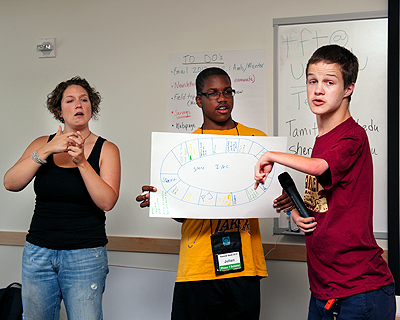Universal Design of Projects, Conference Exhibits, Presentations, and Professional Organizations


The following resources can be used for private study and group instruction on universal design in education.
Yes. It is possible to fail a student with a disability. The laws mandate access to education, not guaranteed academic success. When a faculty member has provided reasonable academic accommodations, all that is required to comply with the law, and the student does not meet the course requirements, then failing a student is proper and lawful. The following is a compliance checklist that may be helpful:
Students who wish to exercise their right to disability-related accommodations must provide the campus disabled student services office with documentation of their disability. The disabled student services office then notifies their instructors that specific accommodations are necessary. On most campuses, instructors receive written notification describing the nature of the appropriate academic adjustments for the student.
A key challenge faced by many K-12 students with disabilities is obtaining academic print materials in an alternate format. Students who are unable to read standard print (for instance, students with blindness, low vision, or learning disabilities) require their materials in an alternate format, such as Braille, large print, or audio. Increasingly, the medium of choice is electronic text, since students with print disabilities can read, navigate, and search the text with off-the-shelf information technology, perhaps in combination with assistive technologies such as synthesized speech.
The comprehensive Adaptech Project report "Computer and Information Technologies: Resources for the Postsecondary Education of Students with Disabilities" is a good place to start. The report provides information about the findings of an investigation of the needs and concerns of campus-based professionals who provide disability-related support and services to postsecondary students. It is a companion to Adaptech's 1999 study, which investigated the computer technology experiences of over eight hundred Canadian college and university students with disabilities.
Web accessibility is defined by guidelines and standards such as the World Wide Web Consortium's Web Content Accessibility Guidelines, and the Electronic and Information Technology Accessibility Standards, developed by the federal Access Board as required by 1998 Amendments to Section 508 of the Rehabilitation
The Linux Operating System has become increasingly popular on servers and desktop systems, in part because it's freely distributable and open-source and it runs on a variety of hardware platforms. For several years, a number of accessibility-related tools have existed for Linux, but most of them made the console, the DOS-prompt-like environment, accessible. Until recently, GUIs and graphical desktops on Linux, which behave similarly to those on Windows® or Mac®, have remained inaccessible to users with various disabilities.
In February of 2003 the Kentucky Assistive Technology Service (KATS) Network , in collaboration with the Kentucky Department of Education Division of Exceptional Children Services, launched the Accessible Information Technology in Schools (AITIS) project .
"Accessibility Rallies" represent a promising practice for promoting accessible web design. This article describes the Georgia Accessibility Rally (GAR), which was designed to create new, accessible Internet sites for rural Georgia schools, train students in accessible web design techniques, and build the capacity for teachers and administrators to create accessible information technology opportunities for all students.